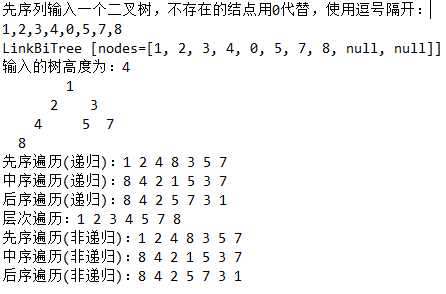二叉树链式存储和遍历
Posted
tags:
篇首语:本文由小常识网(cha138.com)小编为大家整理,主要介绍了二叉树链式存储和遍历相关的知识,希望对你有一定的参考价值。
1 二叉树的链式存储
1.1 链式存储
顺序存储对空间利用率较低,所以,二叉树一般采用链式存储结构,用一个链表来存储一颗二叉树。二叉链表至少包含3个域:数据域data,左指针域lchild和右指针域rchild,如果再加上一个指向双亲结点的指针就变成了三叉链表。

二叉树的链式存储结构如下:
/**
* 二叉链表结点
* @author cyhe
*/
private class Node{
Integer data;
Node lchild, rchild;
}
根据完全二叉树的序列递归创建二叉树,输入序列时不存在的结点用0代替,以下是创建的代码和一些有用的方法。
/**
* 存储先序输入的二叉树,默认大小为10,当超过10自动调用resize方法扩容
*/
private Integer[] nodes = new Integer[10];
public LinkBiTree(){
init();
}
/**
* 获取根节点
* @return
*/
public Node getRoot(){
return root;
}
/**
* 满了自动扩容
* @param max
*/
private void resize(int max){
Integer[] temp = new Integer[max];
for(int i=0; i<nodes.length; i++){
temp[i] = nodes[i];
}
nodes = temp;
}
/**
* 先序输入二叉树,不存在的结点使用0
*/
public void init(){
System.out.println("先序列输入一个二叉树,不存在的结点用0代替,使用逗号隔开:");
// String[] ins = StdIn.readString().split(",");
String[] ins = "1,2,3,4,0,5,7,8".split(",");
n = ins.length;
for (int i = 0; i < ins.length; i++) {
if(i>=nodes.length){
resize(2 * nodes.length); // 扩大两倍
}
nodes[i] = Integer.valueOf(ins[i]);
}
System.out.println("LinkBiTree [nodes=" + Arrays.toString(nodes) + "]");
root = build(1); // 递归创建树
System.out.println("输入的树高度为:"+depth(root));
print();
}
/**
* 递归创建一颗树, 使用完全二叉树序列
* @param node
* @param data
*/
public Node build(int index){
if (index > n) {
return null;
}
Integer tmp = nodes[index - 1]; // 获取结点的值
if (tmp == 0) { // 若为 0 表示结点不存在
return null;
} else {
Node node = new Node();
node.data = tmp;
node.lchild = build(2 * index); // 创建左子树
node.rchild = build(2 * index + 1); // 创建右子树
return node;
}
}
/**
* 递归获取二叉树的高度
* @return
*/
public int depth(Node node){
if(node != null){
int l = depth(node.lchild); // 左子树高度
int r = depth(node.rchild); // 右子树高度
return l > r ? l + 1 : r + 1; // 树的高度为子树最大高度加上根节点
}
return 0; // 空树高度为0
}
1.2 层次遍历
/**
* 层次遍历,利用队列是实现
*/
public void levelOrder(Node root){
RingBuffer<Node> queue = new RingBuffer<Node>(n+1);
queue.put(root); // 根节点先进队列
while(queue.size()>0){
Node tmp = queue.get();
System.out.print(tmp.data + " "); // 根
if (tmp.lchild != null) { // 如果根节点的左子树存在,把左子树编号入栈
queue.put(tmp.lchild);
}
if (tmp.rchild != null) { // 如果根节点的右子树存在,把右子树编号入栈
queue.put(tmp.rchild);
}
}
}
1.3 先序遍历
1.3.1 递归实现
/**
* 递归先序遍历
*/
public void preOrderRecur(Node node){
if(node != null){
System.out.print(node.data+" "); // 根
preOrderRecur(node.lchild); // 左
preOrderRecur(node.rchild); // 右
}
}
1.3.2 非递归实现
实现方法1:
/**
* 非递归先序遍历
*/
public void preOrder(Node node){
ArrayStack<Node> stack = new ArrayStack<Node>(n + 1);
stack.push(node);
while (!stack.isEmpty()) {
Node tmp = stack.pop();
System.out.print(tmp.data + " "); // 根
if (tmp.rchild != null) { // 如果根节点的右子树存在,把右子树编号入栈
stack.push(tmp.rchild);
}
if (tmp.lchild != null) { // 如果根节点的左子树存在,把左子树编号入栈
stack.push(tmp.lchild);
}
}
}
实现方法2:
/**
* 非递归先序遍历
*/
public void preOrderOne(Node node){
ArrayStack<Node> stack = new ArrayStack<Node>(n + 1);
while (node != null || !stack.isEmpty()) {
while(node != null){ // 把最左侧的全部入栈
System.out.print(node.data + " "); // 根
stack.push(node);
node = node.lchild;
}
Node tmp = stack.pop(); // 弹出最后入栈的左子树
node = tmp.rchild; // 看它有没有右孩子
}
}
1.4 中序遍历
1.4.1 递归实现
/**
* 递归中序遍历
*/
public void inOrderRecur(Node node){
if(node != null){
inOrderRecur(node.lchild); // 左
System.out.print(node.data+" "); // 根
inOrderRecur(node.rchild); // 右
}
}
1.4.2 非递归实现
/**
* 非递归中序遍历
*/
public void inOrder(Node node){
ArrayStack<Node> stack = new ArrayStack<Node>(n + 1);
while (node != null || !stack.isEmpty()) {
while(node != null){ // 把最左侧的全部入栈
stack.push(node);
node = node.lchild;
}
Node tmp = stack.pop(); // 弹出最后入栈的左子树
System.out.print(tmp.data + " "); // 先访问左子树
node = tmp.rchild; // 看它有没有右孩子
}
}
1.5 后序遍历
1.5.1 递归实现
/**
* 递归后序遍历
*/
public void postOrderRecur(Node node){
if(node != null){
postOrderRecur(node.lchild); // 左
postOrderRecur(node.rchild); // 右
System.out.print(node.data+" "); // 根
}
}
1.5.2 非递归实现
/**
* 非递归后序遍历
*/
public void postOrder(Node node){
ArrayStack<Node> stack = new ArrayStack<Node>(n + 1);
Node pre = null; // 前一个访问的结点
while (node != null || !stack.isEmpty()) {
while(node != null){ // 把最左侧的全部入栈
stack.push(node);
node = node.lchild;
}
Node tmp = stack.peek(); // 现在要判断栈内结点有没有右孩子,或者右孩子是否访问过
// 如果当前结点不存在右孩子或者右孩子已经访问过,则访问当前结点
if(tmp.rchild == null || pre == tmp.rchild){
Node n = stack.pop();
System.out.print(n.data + " "); // 访问结点
pre = n;
} else {
node = tmp.rchild; // 否则访问右孩子
}
}
}
2 测试
public static void main(String[] args) {
LinkBiTree<Integer> biTree = new LinkBiTree<Integer>();
System.out.print("先序遍历(递归):");
biTree.preOrderRecur(biTree.getRoot());
System.out.print("\\n中序遍历(递归):");
biTree.inOrderRecur(biTree.getRoot());
System.out.print("\\n后序遍历(递归):");
biTree.postOrderRecur(biTree.getRoot());
System.out.print("\\n层次遍历:");
biTree.levelOrder(biTree.getRoot());
System.out.print("\\n先序遍历(非递归):");
// biTree.preOrder(biTree.getRoot());
biTree.preOrderOne(biTree.getRoot());
System.out.print("\\n中序遍历(非递归):");
biTree.inOrder(biTree.getRoot());
System.out.print("\\n后序遍历(非递归):");
biTree.postOrder(biTree.getRoot());
}
2.1 输出结果

以上是关于二叉树链式存储和遍历的主要内容,如果未能解决你的问题,请参考以下文章